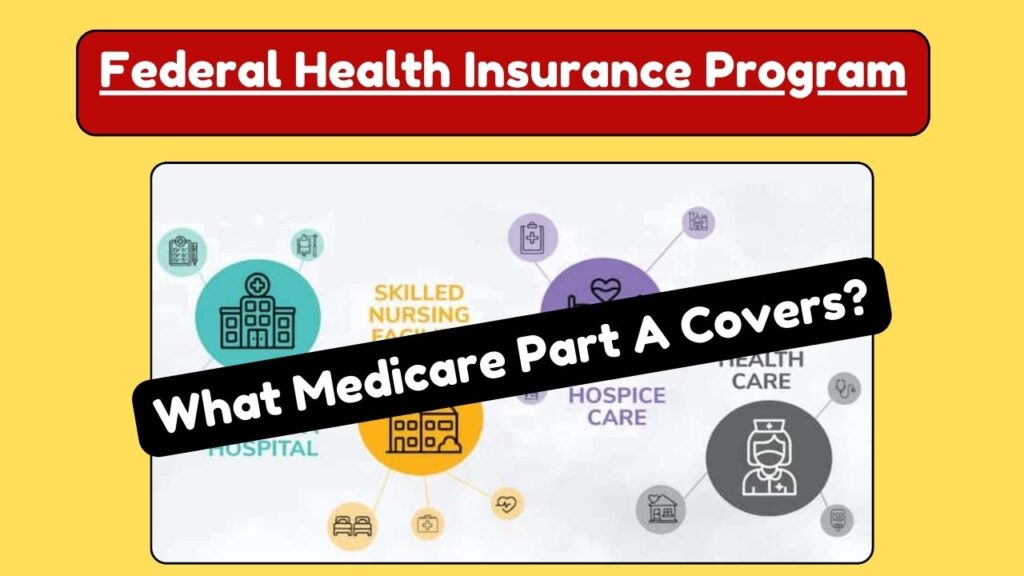Federal Health Insurance Program [Medicare Part A Covers]: Medicare is a federally administered health insurance program designed for individuals aged 65 and older, as well as certain younger individuals with disabilities. The Federal Health Insurance Program consists of two main components:
Original Medicare, which is managed by the federal government, includes two segments—Part A and Part B. Medicare Advantage plans, offered by private insurance companies approved by the Centers for Medicare and Medicaid Services, are referred to as Medicare Part C.
Medicare Part A Covers the Following
Medicare Part A provides coverage for hospital services and various related care options, including skilled nursing facility services and hospice care. Generally, individuals do not incur a premium for Medicare Part A, as most have contributed to the program during their employment. For those already receiving Social Security benefits, enrollment in Part A occurs automatically upon reaching the age of 65.
If an individual is not receiving Social Security, they must enroll within a seven-month period surrounding their 65th birthday, unless they have alternative health care coverage, such as through an employer. Medicare Part A, often referred to as hospital insurance, encompasses inpatient care received in hospitals, skilled nursing facilities, or hospice settings.
Australia $243 COLA Payment 2024: Fact Check, Eligibility, Date & Claim Process
November SSI Checks Payment Date 2024: Who is Eligible & What to do if your payment is missing?
1. HOSPITAL CARE:
- Medicare Part A pays for hospital services when you are admitted by a doctor, covering semi-private rooms, meals, nursing, and medications for inpatient care.
- If you want additional services like a private room or a personal nurse, you will need to cover those extra costs yourself.
- For mental health treatment in a psychiatric hospital, Medicare Part A also provides coverage, but it is limited to 190 days in your lifetime.
- Most hospitals accept Medicare, which is necessary for using Part A, but Veterans Affairs and military hospitals typically do not accept it.
- Medicare Part A includes coverage for various types of facilities, such as acute care hospitals, critical access hospitals, rehabilitation centers, psychiatric facilities, long-term care hospitals, and inpatient care in clinical research studies.
2. NURSING FACILITY:
- Part A provides coverage for short-term stays in certified skilled nursing facilities after a hospital stay of at least three days.
- Included services are a semiprivate room, meals, skilled nursing care, and necessary physical and occupational therapy.
- Additional covered services for your health include speech-language pathology, medical social services, medications, and medical supplies.
- Ambulance transport to the nearest provider for services not available at your facility is covered if other transport could harm your health.
- Your medical team might suggest extra services not covered by Part A, and you would need to pay for those.
3. HOSPICE CARE:
- Hospice provides care for those who are terminally ill, focusing on comfort and support during the end-of-life stage.
- Medicare Part A pays for various services, including pain relief, symptom management, and counseling for families dealing with grief.
- Both Original Medicare and Medicare Advantage plans cover all hospice-related expenses, so check with your insurance for details on accessing these services.
October Centrelink Payment Increase 2024: Eligibility, Claim Process & Fact Check
SSI Award Letter: When will you get Payment & What to do if payment delays?
4. HEALTHCARE SERVICES:
- Medicare offers home health services for individuals who are homebound, with doctor approval and through certified agencies.
- Services covered include part-time skilled nursing, home health aide care, and various therapies like occupational and physical therapy.
- Additional services may include speech-language pathology, medical social services, and certain medications for osteoporosis in women.
- Be careful when arranging home health services, as Medicare does not cover 24-hour care, meal delivery, or homemaker services if they are the only needs.
- It’s important to research which services are covered under Medicare Part A and understand your financial responsibilities.
ELIGIBILITY REQUIREMENT
- You can get Medicare Part A if you are 65 years old or older.
- You qualify if you have been on Social Security or Railroad Retirement Board disability for 24 months.
- If you have Amyotrophic Lateral Sclerosis (ALS), you are also eligible for Medicare Part A.
- Those with end-stage renal disease (ESRD) can qualify if they meet specific criteria.
- Meeting any of these conditions makes you eligible for Medicare Part A.
EXCEPTIONS
- Extra features like a private room, toiletries, or a TV and phone if not already provided in your hospital room.
- Extended care in a nursing facility is also not available.
- Around-the-clock home health support
- Various personal assistance options
- Medications prescribed for home use
COST OF THE MEDICARE A
- Most people do not have to pay a monthly premium for Medicare Part A if they or their spouse worked and paid Medicare taxes for at least 10 years.
- However, there are still other expenses like deductibles and coinsurance that must be covered by the individual.
- This means that Medicare Part A is not completely “free,” as some might think.
- For instance, the deductible for Medicare Part A in 2024 is $1,632 for each hospital admission during a benefit period, and this amount may change in 2025.
- If neither you nor your spouse meets the work criteria, you will have to pay a monthly premium, which was between $278 and $505 in 2024, based on your Medicare tax payment history.
DOES IT COVER 100% OF THE PAYMENT?
- Medicare Part A does not cover all costs of a hospital stay.
- You may have out-of-pocket expenses unless you have a Medigap plan.
- There is a deductible of $1,600 for each benefit period when hospitalized.
- If your stay is longer than 60 days, you will incur coinsurance fees.
- A new benefit period requires you to pay the $1,600 deductible again.
SOME POINTS TO REMEMBER
Medicare plans include PDP, HMO, PPO, or PFFS options that have a Medicare contract. Joining these plans depends on whether the contract is renewed. Benefits and plan availability can differ by provider and location. This is not connected to or approved by any government agency. Each year, Medicare reviews plans using a 5-star rating system.

